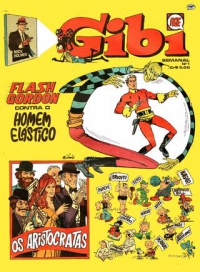Gibi Semanal: Difference between revisions
(Created page with "'''Gibi Semanal''' was a Brazilian comic book series, published by RGE between October 1974 and July 1975. Forty issues were published with issue #28 containin a Mandrake sto...") |
mNo edit summary |
||
| (3 intermediate revisions by 2 users not shown) | |||
| Line 1: | Line 1: | ||
'''Gibi Semanal''' was a Brazilian comic book series, published by [[RGE]] between October 1974 and July 1975 | {{Series | ||
|Title= Gibi Semanal | |||
|image= [[Image:Gibi-Semanal-01.jpg|200 px]] | |||
|Sample= First issue | |||
|Country= [[Image:mini_brazil.gif]] Brazil / Portuguese | |||
|Publisher= [[RGE]] | |||
|Date= 1974-1975 | |||
|Issues= 40 | |||
|Format= 40×30 cm, b/w & color | |||
|}} | |||
'''Gibi Semanal''' was a Brazilian comic book series, published by [[RGE]] between October 1974 and July 1975. | |||
==History== | ==History== | ||
In October 1974 RGE (now known as Editora Globo) took the | In October 1974 RGE (now known as [[Editora Globo]]) took the initiative to revive the [[Gibi]] magazine. First published in 1939, it originally had in its pages Charlie Chan, Alley Oop, Ferdinand and several other characters. At that time, Gibi meant boy, black boy, but after a period the word became associated with comic books themselves and has since become a kind of "synonym" to comics. | ||
Relaunched with a weekly periodicity, the magazine, included stories from a large range of characters such as Popeye, Tarzan, Dick Tracy, The Spirit, etc. Published in large format ( | Relaunched with a weekly periodicity, the magazine, included stories from a large range of characters such as Popeye, Tarzan, Dick Tracy, The Spirit, etc. Published in large format (40cm x 30cm), the covers were drawn by [[Walmir Amaral de Oliveira]] and Murilo Marques Moutinho. | ||
The magazine started with a circulation of 160,000 copies, and the last edition (#40) sold "only" 35,000 copies (a figure considered low by RGE standards). | The magazine started with a circulation of 160,000 copies, and the last edition (#40) sold "only" 35,000 copies (a figure considered low by RGE standards). | ||
==Issue overview== | ==Issue overview== | ||
<gallery | ===Regular series=== | ||
Image:Gibisemanal.png|[[Gibi Semanal 28|''Gibi Semanal'' #28]] | ===Issues with Mandrake=== | ||
<gallery> | |||
Image:Gibisemanal.png|<center>[[Gibi Semanal 28|''Gibi Semanal'' #28]] | |||
</gallery> | </gallery> | ||
{{Brazil}} | |||
[[Category:Gibi Semanal issues| ]] | [[Category:Gibi Semanal issues| ]] | ||
Latest revision as of 08:12, 20 July 2016
| Gibi Semanal | |
 First issue | |
| Country/language: | |
|---|---|
| Publishing company: | RGE |
| Publishing years: | 1974-1975 |
| Issues: | 40 |
| Format: | 40×30 cm, b/w & color |
Gibi Semanal was a Brazilian comic book series, published by RGE between October 1974 and July 1975.
History
In October 1974 RGE (now known as Editora Globo) took the initiative to revive the Gibi magazine. First published in 1939, it originally had in its pages Charlie Chan, Alley Oop, Ferdinand and several other characters. At that time, Gibi meant boy, black boy, but after a period the word became associated with comic books themselves and has since become a kind of "synonym" to comics.
Relaunched with a weekly periodicity, the magazine, included stories from a large range of characters such as Popeye, Tarzan, Dick Tracy, The Spirit, etc. Published in large format (40cm x 30cm), the covers were drawn by Walmir Amaral de Oliveira and Murilo Marques Moutinho.
The magazine started with a circulation of 160,000 copies, and the last edition (#40) sold "only" 35,000 copies (a figure considered low by RGE standards).
Issue overview
Regular series
Issues with Mandrake
